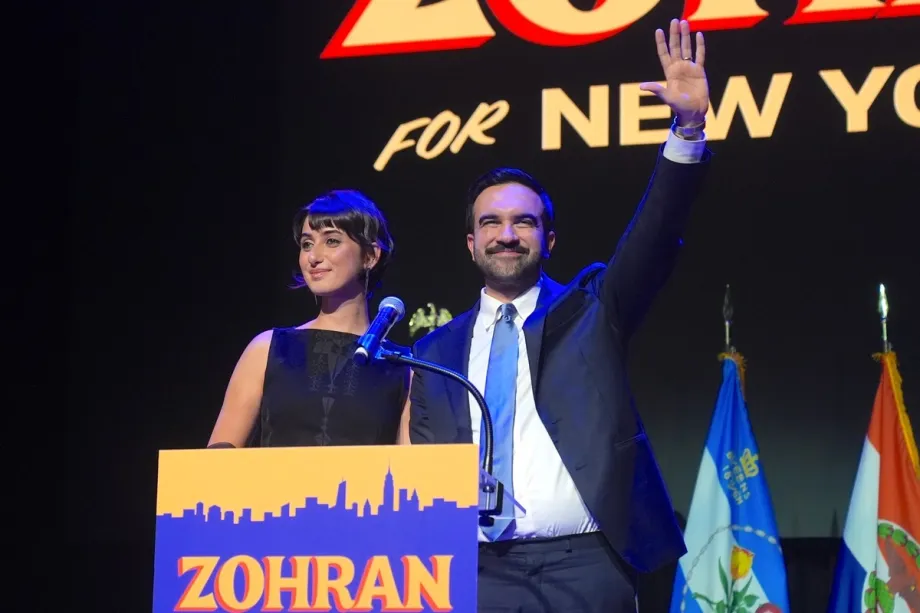Last night, in one of the most dramatic elections in recent US history, Zahran Mamdani, a Muslim candidate of Indian African descent, achieved a landslide victory. This triumph came despite facing formidable opposition from the forces of Zionism, capitalism, and racialist religious supremacism, which mobilized significant resources in terms of money, muscle, and power against him.
The victory of Zahran Mamdani, the son of renowned intellectual Mahmood Mamdani and Film maker Mira Nair, as a Democratic candidate in New York mayoral elections is far more than a local electoral victory. It signals a deeper undercurrent—a growing rebellion against the entangled machinery of global capitalism, racialised securitisation, Zionist impunity, and Islamophobic silencing.
In the heart of New York, one of the most securitised and capital-rich spaces on the planet, Mamdani’s emergence stands as a critique of the global order. It is an insurgency within the very citadel of imperial liberalism. His campaign foregrounds anti-austerity politics, solidarity with Palestine, and the dismantling of carceral and corporate logics that have defined American life for decades. It is, in essence, a blow to what The Globalisation of World Politics calls “the disciplining power of capitalism.”
For years, the mere act of criticising Israel—even for its brutal siege of Gaza or its apartheid policies—has been enough to trigger political excommunication. The term “antisemite” has often been deployed not to combat real hate, but to securitize dissent. Any moral critique of Zionist settler colonialism was cast as existential threat and thus silenced. In Mamdani’s case, too, this familiar script was attempted: the labels of “Pro-Hamas,” “Antisemitic,” and “extremist” were hurled. But this time, it didn’t work.
READ: Zohran Mamdani elected New York City’s first Muslim mayor: AP projection
The people of New York—multi-ethnic, young, politically awakened—refused to accept this securitisation. The old rhetorical weapons no longer resonate. Zionism’s carefully curated moral immunity, built upon the tragic weight of the Holocaust, is eroding under the real-time horrors of a genocidal siege in Gaza. The shield of historical victimhood has cracked—not because the Holocaust is forgotten, but because it is being morally manipulated to justify colonial violence.
Even prominent Jewish scholars and intellectuals—such as Noam Chomsky, Norman Finkelstein, and Ilan Pappé—have long warned about this moral dissonance. Yet, governments have remained complicit. Streets across the West have mobilised in support of Palestine, but policies have not shifted. The disconnect between public sentiment and the actions of the power elite is glaring. The political representation of this street sympathy has been manipulated through manufactured consent and a false victimhood narrative propagated by large, conglomerate-controlled media outlets. Mamdani’s nomination suggests that the public may finally be finding a way to express their views through electoral channels, despite the entrenched media-industrial Zionist consensus.
Yet in India, the silence is deafening.
Despite Zahran’s cultural and familial linkages with India, the so-called liberal intelligentsia and the Hindutva right have found rare unity: in ignoring him. Why? Because he identifies unapologetically as a Muslim. Because he challenges Hindutva and Zionism with equal clarity. Because he doesn’t perform his identity for liberal comfort. While India was quick to celebrate Kamala Harris and Rishi Sunak—symbols of minority success within dominant systems—it refuses to acknowledge Mamdani, who represents defiance, not assimilation.
This is not just the prejudice of the right-wing. It reveals a deep Islamophobia embedded within India’s secular elite—those who pride themselves on defending the social fabric but look away when a Muslim victory doesn’t align with sanitized, capitalist liberalism. Mamdani is inconvenient. He is too political, too Muslim, too critical.
But he is also the embodiment of a long tradition. The son of Mahmood Mamdani—whose work deconstructs the legacies of colonial violence, racial statecraft, and the “good Muslim/bad Muslim” dichotomy—Zahran is the intellectual and political heir to global decolonial thought. His mother, Mira Nair, whose films have captured migration, racial tension, and identity, adds a cultural dimension to this lineage of resistance.
In a world that feels increasingly bleak, Mamdani’s nomination offers a rare moment of clarity: that cracks have begun to appear in the mirror of empire. The hegemon can still silence, still dominate—but not without resistance, and not without fracture. For those who dream of justice—not just electoral wins—Zahran Mamdani’s nomination is a reminder that history is not yet finished.
READ: Syria, the Muslim Brotherhood and Al-Sharaa’s manoeuvring
The views expressed in this article belong to the author and do not necessarily reflect the editorial policy of Middle East Monitor.
